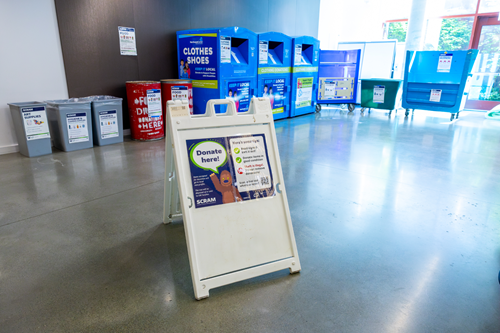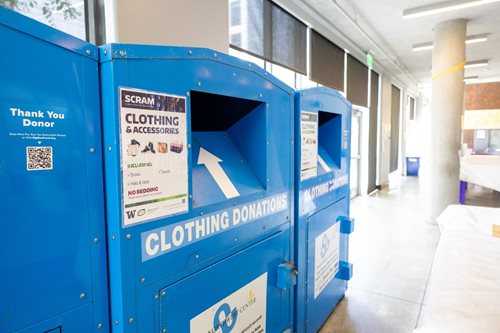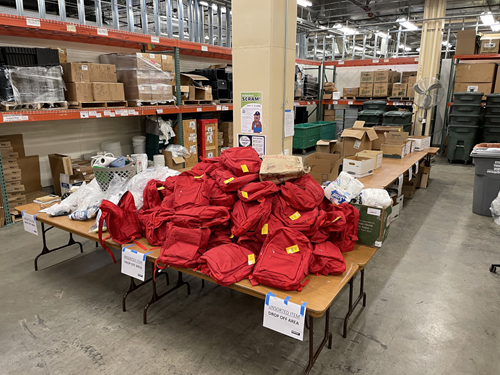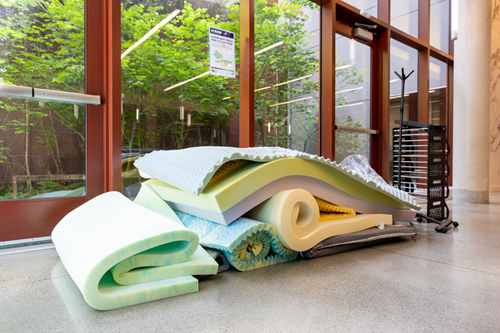UW Supports the Local Community and Promotes Sustainability During Residence Hall Move-Out
June 17, 2024 by Paige Stanley
Between Monday June 3 and Saturday June 8 of 2024, 8,400 UW students moved out of their on- campus residence halls and apartments for the summer. This year, students will move out June 9 - 14th.
As students gather their excitement of embarking on summer plans after a successful year, many also notice how many belongings they have accumulated and must move out.
In partnership with UW Recycling, Housing & Food Services works to curb the waste accumulation from this mass exodus by encouraging residents to donate unwanted items and setting up a space to do so through the annual SCRAM (Student, Cleanup, Recycle and Move-out) event.
“[SCRAM is] primarily a donation collection program to take all of the materials that students cannot take with them and get it into the hands of organizations that need those materials,” UW Recycling Manager, Liz Gignilliat, said.

This year, SCRAM donated 26,993 pounds of material - equivalent to roughly 13.5 tons – to local organizations. About 5,185 pounds of material went to the UW Surplus Store for resale, and 843 pounds of material that could not be donated was recycled.
UW Recycling staff members spend each day of SCRAM sorting through student donations to distribute to various local organizations including the UW School of Art Free Materials Library, Northwest Center, University District Food Bank, DESC, Seattle Office of Emergency Management, UW Food Pantry, and UW Surplus Store.
To make donating easy for students, HFS and UW Recycling set up six donation sites throughout North and West Campus residence halls, each equipped with large bins for the different categories of accepted donations.

SCRAM primarily receives clothing, emergency backpacks, food, and toiletries. SCRAM accepts household items including small kitchen appliances, cleaning supplies, furniture, and more.
The assistant director of custodial services and sustainability initiatives for HFS, Kate Flowers, explained that SCRAM provides extremely useful materials for local nonprofits. Many HFS residents donate the red emergency backpacks they are required to purchase when they live in the residence halls; the packs are then filled with toiletries and distributed in the community.

There are many other ways that the partners leading SCRAM get creative to repurpose as much of the material as possible. However, multiple tons of garbage were still sent to the landfill this year.
“Our program is dependent on what vendors will take,” UW Recycling’s Marketing & Outreach Specialist, Amanda Dassoff, said, noting that the sheer volume of materials that SCRAM receives means not everything can be donated. Unfortunately, some items such as foam mattress toppers aren’t accepted by any vendors and must be sent to the landfill.

SCRAM plays a huge role in diverting waste and is vital to the functioning of the campus. If not for the event, trash chutes would constantly be overflowing, and hallways would be filled with abandoned items. To continue to reduce the amount of waste sent to the landfill each year, HFS and UW Recycling work to promote sustainably tactics year-round.
Waste Reduction Tactics
HFS places a strong emphasis on sustainability across all of its operations and is one of the primary players in the UW's consistent recognition as one of the most sustainable college campuses nationwide.
Aside from encouraging students to take things home early and reuse items the next year, both HFS and UW Recycling encourage sustainability from the start by urging students and their parents to buy less in the first place in order to have less waste during SCRAM.
“It starts from when you move in,” Flowers said. “Work with your roommate on duplication of items. You do not need to decorate your place as much as you think, you do not need as many clothes there as you think and get acquainted with thrift shops.”
Gignilliat agrees, saying “Wait before buying things, and really consider your lifestyle in the residence hall before bringing in a bunch of stuff.”
“Really, we don’t want to have a SCRAM,” Flowers said. “We work hard with SEED (Students Expressing Environmental Dedication) to encourage [students] to do clothing swaps and other pieces so that students can keep reusing things within the community itself.”
For more information on how to make Move-out easier and tips on sustainable living, check out UW Recycling’s 9 tips to move into on-campus housing sustainably.
Want to learn more about waste on campus? Take UW Recycling’s course for students and staff.
go back